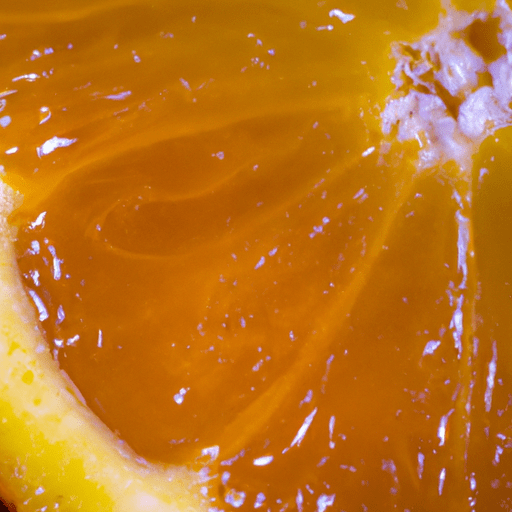Exploring the World of Orange Bitters: A Subtle Tang to Elevate Your Culinary Creations
Orange bitters, with its unique and complex flavor profile, adds a delightful twist to both sweet and savory dishes. Whether you are an adventurous home cook or a seasoned culinary connoisseur, this versatile ingredient is certain to elevate your creations to new heights. In this article, we will delve into the world of orange bitters, exploring its taste, common uses in cooking, nutritional value, and uncovering some interesting history and facts along the way.
A Symphony of Flavors and Aromas
Orange bitters are a delightful blend of bitter orange peels, spices, and herbs, infused into an alcohol base. This aromatic concoction boasts a refreshing citrusy scent that immediately captivates the senses. The flavor profile of orange bitters is a harmonious balance between bitter and sweet, with subtle notes of zesty orange that dance on the palate. Its complex and multidimensional taste adds depth to a wide variety of dishes, making it a secret weapon for culinary enthusiasts worldwide.
Culinary Applications: The Versatile Elixir
Orange bitters enrich a myriad of culinary creations, both sweet and savory. Let’s explore some of the popular applications where this magical elixir can truly shine:
1. Cocktails:
Orange bitters are a staple ingredient in countless classic and contemporary cocktails. Adding just a few drops of this elixir can transform an ordinary cocktail into a refined and sophisticated libation. From the iconic Old Fashioned to the intriguing Negroni, the possibilities are endless when it comes to incorporating orange bitters into your mixology adventures.
2. Sauces and Marinades:
For an extra layer of complexity, orange bitters can be incorporated into various sauces and marinades. Whether you’re preparing a tangy citrus glaze for roasted poultry or creating a robust marinade for grilled meats, this versatile ingredient imparts a unique depth of flavor that will tantalize your taste buds.
3. Desserts:
Orange bitters bring a delightful twist to sweet treats, adding a touch of sophistication. From creamy custards and velvety ice creams to decadent chocolate desserts, a hint of orange bitters can elevate the dessert to new heights, leaving a lasting impression on those fortunate enough to indulge.
4. Salad Dressings:
For those craving a vibrant and refreshing salad, look no further than orange bitters. A few dashes of this elixir in your homemade vinaigrette will create a symphony of flavors, balancing the acidity with a subtle citrusy twist. It’s a perfect way to elevate even the simplest green salad.
Nutritional Value: A Hint of Sunshine
While orange bitters may not provide significant nutritional benefits due to their small quantities used in cooking, it is worth noting that bitter oranges are rich in vitamin C and dietary fiber. Additionally, the aromatic compounds found in orange bitters can stimulate the taste buds and enhance digestion, making it a welcome addition to a well-rounded culinary experience.
A Dash of History and Fascinating Facts
Dating back to the 1800s, the use of bitters in cocktails originated as a way to cure ailments and aid digestion. Orange bitters, specifically, quickly became popular due to the bright and refreshing flavor it imparted on both alcoholic and non-alcoholic beverages. Although its popularity had waned for a certain period, orange bitters have recently experienced a well-deserved renaissance, finding their way back to cocktail bars, restaurant kitchens, and home pantries.
It’s important to note that not all orange bitters are created equal. Different brands and varieties offer unique flavor profiles, ranging from vibrant citrusy notes to more herbaceous and spiced undertones, allowing you to find the perfect match for your culinary endeavors.
Unleash Your Creativity with Orange Bitters
Orange bitters, with its enchanting aroma and complex taste, deserve a spot in every culinary aficionado’s arsenal. Whether you seek to shake up a stunning cocktail, create a memorable sauce, or add a touch of sophistication to your desserts, this versatile elixir is sure to elevate your dishes to new culinary heights. So, go ahead, grab a bottle of orange bitters, and unleash your creativity in the kitchen. Your taste buds will thank you for it!
Note: When using orange bitters in cooking, remember that a little goes a long way. Start with just a few drops and taste as you go to find your desired level of citrusy complexity.
Orange Bitters
Origin: Orange bitters are a type of bitters made from the peels of oranges. They originated in the early 19th century in England.
Common uses: Orange bitters are primarily used as a flavoring agent in cocktails. They add a bitter and citrusy taste, enhancing the overall flavor profile. Classic cocktails such as the Old Fashioned and the Martini often include a few dashes of orange bitters to round out their flavors.
Nutritional benefits: Orange bitters are typically used in small amounts, so their nutritional values are negligible. They are not consumed in large quantities to provide notable health benefits.
Unique properties: Orange bitters have a distinct flavor profile characterized by bitter orange zest, herbs, and spices. They often contain ingredients like gentian root, cardamom, cinchona bark, and clove. These ingredients contribute to the overall complexity and depth of flavor.
Historical significance: Orange bitters once played a significant role in early cocktails, particularly during the pre-prohibition era. They were widely used as a key ingredient in classic cocktail recipes, but their popularity declined during the prohibition period in the United States. However, in recent years, there has been a revival of interest in classic cocktails, leading to a resurgence in the use of orange bitters in mixology.




Use the share button below if you liked it.
It makes me smile, when I see it.